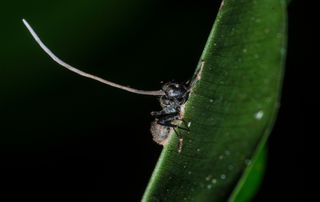Zombie Ants Are Controlled by a 'Master Puppeteer' Parasite, But We Still Don't Know How

A mind-controlling parasite turns ants into zombies, forcing them to climb to the tops of shrubs, bite down and die. Now, a new study finds that the fungus acts like a puppeteer, somehow "pulling" the ants' mouth muscles.
The mind-controlling fungus breaks through the ant's exoskeleton and enters its body, where it begins to grow and spread, said lead author Colleen Mangold, a postdoctoral researcher in the Department of Biochemistry and Molecular Biology at The Pennsylvania State University. [Mind Control: Gallery of Zombie Ants]
The first week after being infected, the ants act normally, Mangold told Live Science. But then they begin to have trouble moving and start to have muscle spasms.
"They walk around rather aimlessly and in circles, or they don't move much at all," Mangold said. During the last stage of the disease, they find a surface and bite into it — that surface is typically the top of a shrub. After the ants die, the fungus emerges from the ant and seeks out its next victim.
Mangold and her team wanted to figure out what exactly was causing these ants to bite down. Previous studies showed that by the time the ants bit down at the tops of shrubs or twigs, the fungus had already tangled around the muscles of the ants' lower jaw, she said. But it was unclear how the fungus forced the jaws to move.
So the scientists infected a handful of carpenter ants with the mind-controlling Ophiocordyceps kimflemingiae fungus. After the infected ants died, the scientists froze the ants and removed their jaw muscles and examined them under the electron microscope. At the time of death, the ants' mouth muscles were forcefully contracting.
It's still a mystery how the parasite accomplishes this task, but they found mysterious particles, which might potentially play a role in the fungus' zombie death grip, Mangold said. These strange particles may contain something that helps the fungus contract the ants' mouth muscles, or the particles may just be secreted by the ant to fight off the infection, she said. Mangold’s team now hopes to figure out what these particles are and whether they hold anything, she added.
Sign up for the Live Science daily newsletter now
Get the world’s most fascinating discoveries delivered straight to your inbox.
Surprisingly, the researchers found no evidence of the fungus affecting brain cells or the connections between them. So "we don't know how the fungus is able to impact the behavior of the host," she said. "We are just beginning to scratch the surface here."
These findings were published July 17 in the Journal of Experimental Biology.
- Zombie Facts: Real and Imagined (Infographic)
- Photos: How a Fungal Disease is Disfiguring Snakes
- Photos: Zombie Beetles Hang from Flowers
Originally published on Live Science.

Yasemin is a staff writer at Live Science, covering health, neuroscience and biology. Her work has appeared in Scientific American, Science and the San Jose Mercury News. She has a bachelor's degree in biomedical engineering from the University of Connecticut and a graduate certificate in science communication from the University of California, Santa Cruz.
Most Popular

